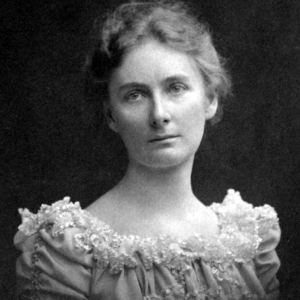 Originally published in the ebook A Passion for Science: Stories of Discovery and Invention.
Originally published in the ebook A Passion for Science: Stories of Discovery and Invention.
by Jessica Ball
Florence Bascom would have been a remarkable woman in any age, but in her own time she was an outstanding proponent of science and women’s place in it. The field of geology was in its infancy in the 19th century, and Dr Bascom was a pioneer, not only in that she was a woman demanding a position among men, but also in her mastery of the foundational skills of petrography and crystallography, and her uncompromising standards for the geologists she trained and who succeeded her. As a woman pursuing geology for my own career, I find much in Florence Bascom to admire, and look on her as a kindred spirit in my own love of studying the Earth.
Bascom was born in 1862 and had a great advantage in her family: her parents had both studied at seminaries. Her mother, a schoolteacher, was active in women’s clubs and the newly growing feminist movement, and her father led an academic life, first as a professor of oratory and rhetoric at Williams College and then as president of the University of Wisconsin. Florence herself excelled in school and went on to attend Wisconsin while her father was president. By the time she graduated in 1884 she had added an impressive array of qualifications to her name, including a bachelor’s degrees in literature, arts, and natural science, which she then followed with a master’s in geology in 1887 (also at Wisconsin).
She was never afraid to speak up and demand what was due her, even as accounts that chronicled her accomplishments described her as “quiet and self-possessed, a woman who is reserved, of few words.” (This description is immediately followed by the writer suggesting that she is “apparently possessed of great determination, which, however, does not mar her general attractiveness” — an unfortunate trend of reporting which I still see today. As if appearance had anything to do with ability!) She managed, against the opposition of no one less than the president of Johns Hopkins University itself, to convince them to admit her to the school for advanced geological study. She was, however, denied the right to enrol as a regular student and was forced to take classes sitting behind a screen so she would not “distract” the male students!
Geological foundations
Her doctoral thesis, published in 1896 by the United States Geological Survey, is as readable now as it was nearly 120 years ago. Indeed, it is still considered a foundational work of Appalachian geology. In it she corrected misconceptions created during earlier mapping in the South Mountain area of Pennsylvania — the very northern tip of the Blue Ridge Mountains, a province I grew familiar with in college. She used petrographic microscopy to establish the origins of the rocks there, a relatively new approach for geologists at the time. As it turns out, the rocks of South Mountain are not sedimentary as previous workers had proposed, but are metamorphosed rhyolites and basalts, a distinction which she points out rather caustically at times. My favourite phrase refers to some sloppy structural interpretations made by her predecessors:
“This section shows stratified rocks lying in a series of anticlinal flexures, which accord rather with Professor Rogers’s conception of ‘rock waves’ than with his observed dips. The dips are, without a single exception, to the southeast.”
Through Dr Bascom’s work on South Mountain, we learned a great deal about the truly ancient volcanic history of the eastern United States, particularly the later-named Catoctin metabasalt and one of the only occurrences of rhyolite on this side of the country.
Florence Bascom had a life of firsts: first female PhD at Johns Hopkins in 1893 (though not the first female geology PhD in the United States – that distinction went to Mary Holmes in 1888), first female research scientist at the United States Geological Survey (USGS), one of the first female fellows of the Geological Society of America, and the first female vice president of the organisation. Some have even described her as the first woman geologist in the United States, although that is untrue, but she is probably the most famous of the first practicing women geologists. She also founded the geology department at Bryn Mawr College and taught there for more than thirty years.
In an era when women were frowned upon simply for donning short skirts to ride bicycles, Dr Bascom spent a great deal of her time in the field, doing all the hiking and schlepping and sampling that her male colleagues did, and in a high-necked gown to boot! She was an expert in crystallography, mineralogy, and petrography, which (particularly in the case of crystallography and petrology) were still young branches of geology in her time. During her PhD research and her time working for the USGS, she became an expert on the crystalline rocks of the Appalachians as well as Piedmont geomorphology, and published more than 40 papers on everything from the provenance of the South Mountain volcanics to clarifications of geomorphologic terms.
The importance of networks
Aside from the short book The Stone Lady, which I have leaned on heavily for this biography, it is difficult to find many accounts of Florence Bascom which describe her accomplishments on their own terms rather than linked with famous male names of the day. When she is described as a pioneer of the then newly-developed petrography methods, it is with a reference to her teacher George Huntington Williams; when she took a leave from her position at Bryn Mawr to learn crystallography in Germany, her name is overshadowed by Victor Goldschmidt, in whose laboratory she worked. Granted, this particular memoir was published in 1946, but it would have been nice to know more about Dr Bascom without always leaning on the prestige of her teachers, however worthy they were of acclaim.
My teachers and academic advisors have certainly been an integral part of my geologic life, but I don’t define myself by their accomplishments. However, Clary and Wandersee, in their 2007 article about Dr Bascom, argue that she would not have been able to make the inroads on the field of geology without taking advantage of her male contacts, which is definitely an important point to remember, especially for those of us who have been lucky enough not to have to fight for the right to do what we love. And as many of us know, networking is a good way to find opportunities and advance a career. That Florence Bascom engaged in it is surely a sign of a canny and capable scientist.
Florence Bascom’s biographers also make a point of emphasising how important her mentoring and teaching were for women in geology in the twentieth century. The geology program she began at Bryn Mawr became internationally known and praised. She wasn’t shy about expressing her pleasure in this accomplishment and those of her students and in a letter to Professor Hermann Fairchild, she remarked, “I have considerable pride in the fact that some of the best work done in geology today by women, ranking with that done by men, has been done by my students… these are all notable young women who will be a credit to the science of geology.”
Her students trained in the field and laboratory as well as in the lecture hall, and learned petrography from a wide array of geological specimens and thin sections that Dr Bascom collected from over many donors. Her courses were tough, and she held her students to high standards – and any young geologist who has ever struggled through a tough lecture and come out with a better understanding of the topic should know to thank their instructor for being so uncompromising!
The woman behind the science
The accomplishments I’ve mentioned would be a credit to any geologist – but they don’t give us a very good idea of what Florence Bascom was like personally. Her biographers were careful, however, to describe the woman behind the science. In fact, their accounts could, with a few tweaks, describe just about any woman in geology today:
- She loved animals and spent her spare time riding her horse Fantasy around various campuses and her retirement home in Massachusetts.
- She was by all accounts an unaccomplished cook, and anyone visiting her could expect to be fed canned soup and dry cereal.
- She bicycled to work and wore divided skirts – then more than a bit scandalous – to do it.
- She loved semiprecious stones and jewellery made with them, and would often buy pieces for herself and her students.
- She cut her hair short and often didn’t bother styling it.
- Her students described her as a sound teacher, “uncompromising in her standards of scholarship”, and said that she “expected of her students clear and honest thinking, not by precept so much as by example”.
- She was a very hard worker. According to one biographer, she “belonged to a rapidly vanishing time when a young field geologist…was expected to be in the field by seven in the morning, not to return under ordinary circumstances until six o’clock at night, subsequently to devote the evening to drafting and map work.” Eleanora Bliss Knopf, one of her former students, remembers being firmly rebuked for suggesting a later start time for the sake of a more leisurely breakfast!
In fact, barring the cooking, the bicycling and the short hair, this could well be a description of me. I dote on my cat, I have a collection of jewellery that never fails to start geologic conversations, and I once spent time riding horses myself. My own geology professors also instilled in me the love of concise writing and an early start in the field — getting up to start work at seven was par for the course on our field trips! Like Florence Bascom, I tend to be reserved and listen more often than I speak, and I suppose that can make me seem just as shy as she was supposed to have been.
But personal habits aside, Florence Bascom is the kind of geologist I would love to grow up to be. By all accounts she was intensely dedicated to her work and held it to the highest standards of quality and rigour. Her own words are enough to inspire any scientist: of her professional life, she said, “This is the life, to plunge into the welcome isolation of the field, to return to the stimulating association of Bryn Mawr, to observe and in part to clear up geologic phenomena, to return to the exposition and interpretation of geologic phenomena.”
And again, “The selection of work in which one delights, and a diligent adherence to it, are the main ingredients of success.”
In my opinion, she had it right – that to be really happy with your career, you should spend it doing something that you love.
Smoother sailing
Compared to Florence Bascom, my path through a geological career has been smooth sailing. My parents were every bit as supportive as hers, but they were not raising me in an era when the primary occupations women were expected to take up were marriage and motherhood. I did not have to sit behind a screen while completing my graduate coursework so as to not disturb my male classmates. I don’t have to fight with my school to be awarded my degree simply because I identify with a particular gender. I don’t have to deal with people judging me first by my appearance and second by my accomplishments — at least, not in print or to my face. I have not had to prove that I am ‘worthy’ to learn and work alongside my male colleagues; we have all had to prove that we are worthy of our degrees by our intellectual merits alone.
I’ve been surrounded by supportive people from the start — my parents, my undergraduate professors who treated everyone equally, and my graduate professors who did the same, my academic advisors who led by example and never questioned my goals. Florence Bascom had her supporters as well, but there were far more people who challenged her right to pursue her dream. I have not faced the same kinds of challenges she did, but it’s just as important to me to acknowledge that she and others have struggled for their rights, and will again. I am grateful that Dr Bascom forged a path for women in a profession that has taken many years to embrace them.
One final quote from a letter of Dr Bascom’s strikes me deeply as a scientist and a geologist: “The fascination of any search after truth lies not in the attainment, which at best is found to be very relative, but in the pursuit, where all the powers of the mind and character are brought into play and are absorbed in the task. One feels oneself in contact with something that is infinite and one finds a joy that is beyond expression in ‘sounding the abyss of science’ and the secrets in the infinite mind.”
I think that any geologist — any scientist — would agree, that as much of the joy in our work lies in the search for answers as finding them. Otherwise, why would we continue? Certainly there is satisfaction to be found in solving a geologic puzzle once, but Florence Bascom does a wonderful job of describing why we make careers of repeating the quest for knowledge about the Earth. It’s a sentiment I want to carry with me throughout my own career, and I think that any woman, geologist or not, could find a worthy role model in the woman who spoke it.
Further reading
Clary, RM and Wandersee, JH (2007), “Great Expectations: Florence Bascom (1842-1945) and the education of early US women geologists”, Geological Society of London, Special Publications 281,123-135.
Ogilvie, IH (1945), “Obituary: Florence Bascom, 1862-1945”, Science 102(2648), 320-321.
Knopf, EB (1945), “Memorial of Florence Bascom”, American Mineralogist 31, 168-172.
Bascom, F (1896), “The ancient volcanic rocks of South Mountain, Pennsylvania”, Bulletin of the United States Geological Survey 136, 124.
Bascom, F (1931), “Geomorphic Nomenclature”, Science 74(1911), 172-173.
Schneiderman, JS (1997), “A Life of Firsts: Florence Bascom”, GSA Today 7, 8-9.
About the author
Jessica Ball is an active geoblogger who has been writing the Magma Cum Laude geoblog for almost 6 years. She is currently completing her doctoral degree at SUNY Buffalo, focusing on volcanic hazards and using a variety of techniques answer questions about where and why water-related lava dome collapses occur. Previously, she received her BS in Geology from the College of William & Mary in 2007, and worked from 2007-2008 as the Outreach and Education Assistant at the American Geosciences Institute. Like Florence Bascom, she spent some of her formative years waking up early to do field work in the Appalachians, loves semiprecious stones in her jewellery and strives to be a clear and concise writer. She tweets from @tuff_cookie about volcanoes, geology and good geologic puns.
Web: blogs.agu.org/magmacumlaude
Twitter: @tuff_cookie
 Originally published in the ebook
Originally published in the ebook 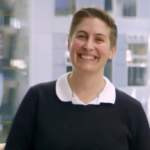 Tara Scott is currently the Route Infrastructure Engineer for the East Midlands Route. During her 15 years with Network Rail she has worked through frontline roles including Track Section Manager (Milton Keynes) and Track Maintenance Engineer (Euston) as well as central engineering roles. Recently she successfully led a project with Network Rail Consulting in Toronto working with the Toronto Transit Commission. As well as being Chartered Engineer with IET, Tara is a fellow of the Permanent Way Institution and sits on their Academic Panel.
Tara Scott is currently the Route Infrastructure Engineer for the East Midlands Route. During her 15 years with Network Rail she has worked through frontline roles including Track Section Manager (Milton Keynes) and Track Maintenance Engineer (Euston) as well as central engineering roles. Recently she successfully led a project with Network Rail Consulting in Toronto working with the Toronto Transit Commission. As well as being Chartered Engineer with IET, Tara is a fellow of the Permanent Way Institution and sits on their Academic Panel.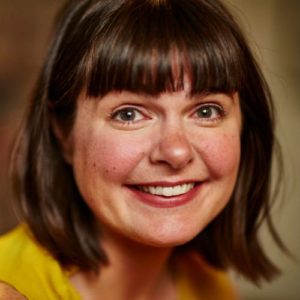 Joeli is the founder of Pregnant Then Screwed, an organisation which protects and supports women who encounter pregnancy and maternity discrimination and lobbies the Government for legislative change. 54,000 women a year are pushed out of their jobs for getting pregnant or taking maternity leave and 77% of working mums encounter some form of discrimination in the workplace. This type of discrimination is a major contributor to the gender pay gap, and via her training organisation, ‘Gendering Change’, Joeli is on a mission to make the labour market work for parents.
Joeli is the founder of Pregnant Then Screwed, an organisation which protects and supports women who encounter pregnancy and maternity discrimination and lobbies the Government for legislative change. 54,000 women a year are pushed out of their jobs for getting pregnant or taking maternity leave and 77% of working mums encounter some form of discrimination in the workplace. This type of discrimination is a major contributor to the gender pay gap, and via her training organisation, ‘Gendering Change’, Joeli is on a mission to make the labour market work for parents.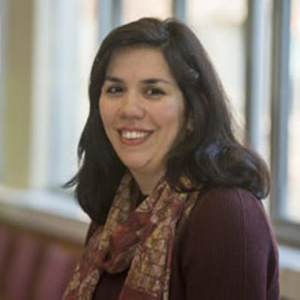
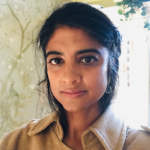
 Originally published in the ebook
Originally published in the ebook